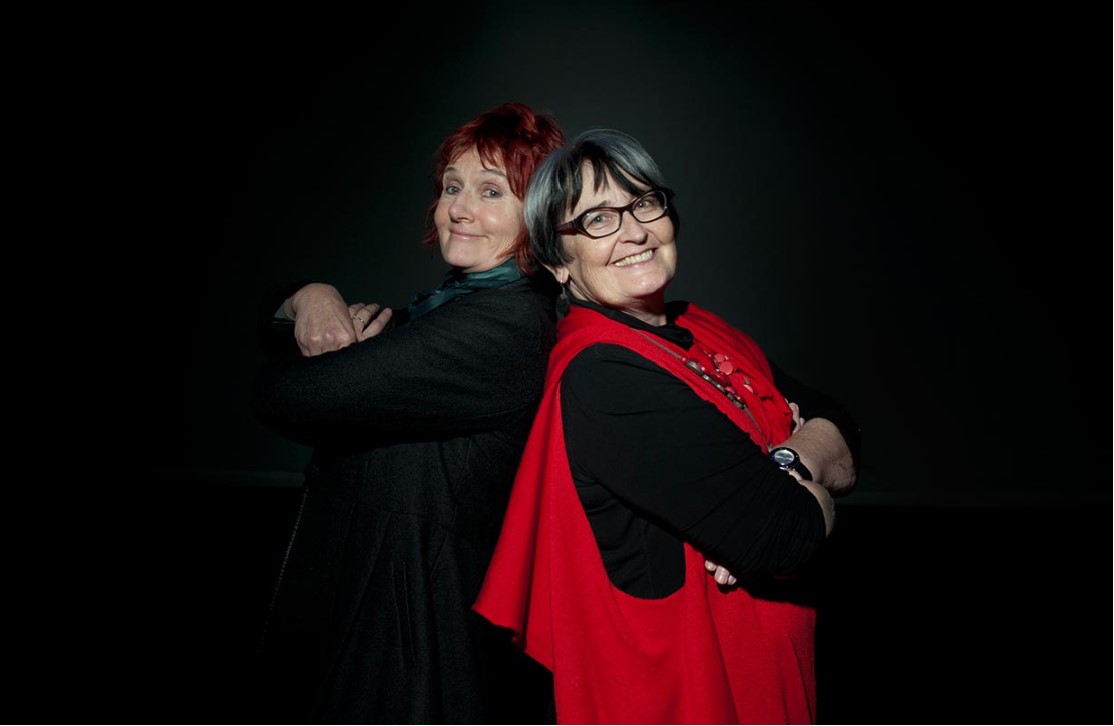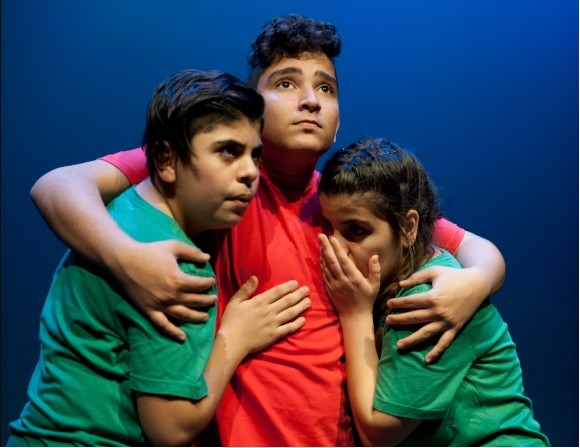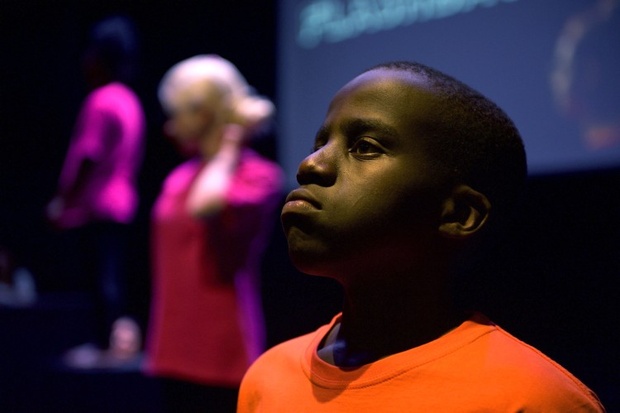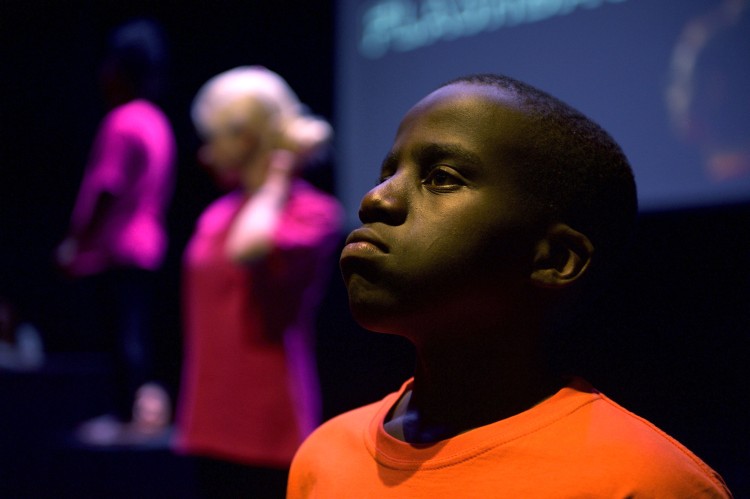For most, along with having to navigate a new language, and new school or different school system, bullying and racism are a daily reality.
Back in 2007, psychologist and school counsellor Catherine Maguire-Donvito was at Miller Technology High School, just west of Liverpool in Sydney’s outer west, running a refugee support program with several other counsellors, becoming highly specialised in refugee issues and trauma, and managing often very complex cases.
She and good friend, EALD and drama teacher, Ruth Hartcher-O’Brien, had the year prior drawn on the stories of a small group of refugee students to put together and perform a play about their experiences.
The audience response was revelation for Maguire-Donvito.
“I noticed that even though a lot of kids in the audience were quite confronted, and there were tears, they came to me and said, ‘Miss, that’s my story, too. That’s what happened to me. And now you know,’ and it was like an epiphany for them.
“They realised that we knew what had happened, and it opened a powerful door for counselling for me,” she says.
Having thought about it for some time, and mindful of how unexplored trauma forces students with refugee backgrounds to experience symptoms of anxiety, depression, and PTSD, the psychologist decided on proactive action.
“I thought ‘I’ll start Treehouse Theatre’ and so got back in touch with Ruth and said, ‘do you want to do this with me?’ she said ‘Absolutely!’, and so that’s how we got started,” Maguire-Donvito says.
Putting down roots
Founded in 2010, Treehouse Theatre is a place where refugee students can channel their displacement experiences using performance development as trauma therapy.
Each year the Treehouse program produces two original plays during two separate semesters, each taking place over a period of 12 weeks and each with a number of performances over several days.
One of the plays is rehearsed each year at Miller Technology High School and presented at Casula Powerhouse in Liverpool, while the other is rehearsed at Holroyd High School in Greystanes and staged at the Seymour Centre in Chippendale.
Left with no alternative, due to little interest on the part of the Department or NSW State Government, and with limited local council funding of $5000, the company was initially self-funded by Maguire-Donvito and husband George with $50,000 of their own retirement savings.
Also donating their time two days a week during the play’s production periods, Maguire-Donvito and Hartcher-O’Brien have spent the best part of 14 years honing and perfecting their unique and powerful ‘therapy’.
A film documented Treehouse Theatre's humble beginnings back in 2014, and looked into the powerful benefits of performance development as trauma therapy.
Starting most often with a group of 15 or so keen refugee students, in the first few weeks, all share funny stories of times in their home countries before they were refugees and before they were forced to flee.
“We also tell stories that are happening here and now, and they’re often funny ones as well, and we do that to build connections and trust in the group,” Maguire Donvito says.
From there the students tell their trauma stories, stories of what made them refugees, or stories that are very sad or difficult for them, which are written into scripts using as much of their own wording as possible.
The scripts are then shaped into a play comprising roughly 25 individual stories.
“The trauma stories in particular, we make sure are absolutely true from the child’s perspective,” Maguire-Donvito says.
Once the scripts are written, they’re given to the students to check, correct, show their parents and get their approval, and once they’re ready to go, the rehearsals commence.
“So what happens with trauma recovery, is that initially, when a child is suffering from trauma, or anybody is suffering from trauma, they have thoughts and memories that are out of control and can be triggered by things that remind them of the event, it might be the smell of smoke, it might be a loud noise,” Maguire-Donvito explains.
“It could be something that they see or something that someone says or something that they see on television, and then they might have flashbacks, and often they’ll have nightmares.”
What Maguire-Donvito says she and her team find is that a lot of these kids, because they experienced the trauma with their family, they often don’t talk about it, as everybody already knows what happened – but the child’s memory is often very fragmented, “or there are just total blank spots”.

Friends and colleagues Ruth Hartcher-O’Brien, pictured above left, and Catherine Maguire-Donvito, above right, started Treehouse Theatre back in 2010 to facilitate trauma recovery for young refugees and to educate the Australian public, especially high school students, about the reality of the refugee experience.
“And we find that, in the first telling of the story, it’s often quite incoherent, and all over the place, and very, very difficult – that’s when all the tears will really be flowing,” she says.
“And then after we write the script, and they read it, and they have a chat with their parents, it starts to build neural pathways into the cognitive part of the brain, the thinking, conscious part of the brain.”
The science behind the talking and listening
Prior to their Treehouse time, these memories are stored in the students’ limbic system, “in the emotional brain and in the primitive animal, physical brain”, and could be triggered there – and because there’s no rationale or understanding or concrete cognitive structures to pin that memory on, “it’s really traumatic”, Maguire-Donvito shares.
“But by talking about it, by performing it, those cognitive pathways start to build. And then in addition to that, the rehearsal process provides for repeated exposure to the traumatic memory.”
Maguire-Donvito says ‘exposure therapy’ is quite a common way of treating phobias. For example, if a child doesn’t want to go to school, is fearful of school, then they’re shown pictures of the school and the school gate. Each session, they go a little further until they’re feeling comfortable. That’s called ‘graduated exposure’.
“And all the time, they’re managing their emotional response and their breathing and so on to manage the anxiety,” Maguire-Donvito says.
She teaches the students these grounding techniques, and they are gradually and repeatedly exposed to the traumatic memories through rehearsal.
A powerful example she uses is a boy who was a participant in Treehouse Theatre some time ago, who was shot through his arm, after jumping in front of his father to save his life.
After saving his father, the boy fell and landed in his grandmother's lap.
“As we were rehearsing, we wanted the boy to end up in a position where he could just lay his head on his grandmother’s lap – and so we had to really choreograph it, and in that process, the whole thing was quite divorced from the actual memory, but at the same time he was learning that, ‘this is OK, I am not going to die’.
Maguire-Donvito explains that the problem with trauma is that, if it’s unprocessed, when the traumatised person thinks about that trauma, they can go back to that moment in time, and genuinely believe that they are going to die.
“So, this actually teaches them that nothing bad is going to happen.
“It’s a horrible memory. It’s really sad.

For the young performers, because it’s performed to a live audience, they see the reaction, they hear people sobbing, they hear people gasping or see them reeling back in horror. PHOTO: Treehouse Theatre
“With this little fellow, he was so brave, everyone thought he was such a wonderful and loving child for having done this, he could now really appreciate what he’d done.
“But before that, it was just a horrific memory that he couldn’t think about because he would be overcome by overwhelming grief and fear.”
Empathy’s power and feeling seen
It’s one of the reasons Treehouse is so powerful, another is that empathy can often help with trauma, or any sort of emotional problem.
“It’s the whole reason why counselling works, is that when you share your story, or what’s happened to another party, who listens and understands and empathises with what’s going on, it makes you feel ‘oh, that was extraordinary what happened – even this counsellor is telling me that she’s really shocked’, or ‘gee, she actually has a tear in her eye – so what happened to me was not right, not good, and there’s nothing wrong with me’,” Maguire-Donvito says.
“And so, when they perform these stories for an audience, the reaction that they get from the audiences is amazing – they laugh their heads off, they cry, and we’re talking really tough kids from some of the toughest schools in Sydney.”
For the young performers, because it’s performed to a live audience, they see the reaction, they hear people sobbing, they hear people gasping or see them reeling back in horror.
“And so that reaction is incredibly validating,” Maguire Donvito says.
“And then at the end, we have a Q&A, where we encourage the audience to give feedback to the kids. And they tell them, ‘You’re amazing. You’re so brave. And your English is so good.’ And so they go from being someone who was ashamed to even admit that they’re a refugee, to feeling a little special.”
Audience members’ powerful learnings
Of course, the benefits stretch far beyond the improved mental health of the performers themselves. For students lucky enough to attend a performance, Maguire-Donvito says it can very often be deeply affecting.
“I think it gives them a really in-depth insight, and by that I mean an emotional, a visceral, understanding of what it means to be persecuted, to experience racism, and to experience bullying – because so many of these stories are based around that.
“Because these people are often different in the schools, they are often the victims of racism and bullying, [the live performance] creates that sort of understanding, that they’re kids just like us ... they have the connection, and realise that they’re just ordinary kids who have had terrible experiences. And so this develops a sense of empathy."
Maguire-Donvito says many in the audience, especially those from more affluent schools will say, ‘I didn’t even understand how lucky I am to be born in Australia’.
“I had one kid from Miller actually say, ‘I saw the show, and those kids are really good'. And the teacher said, ‘did you know a lot of these kids get bullied at school?’ And she was an Indigenous kid, actually, and she turned her head and said, ‘I know, I used to be one of those bullies. Not anymore’."
Time to pass the baton
With a major donation some time ago by Mary MacKillop Sisters of St. Joseph, and a $30,000 grant from philanthropic funding organization TFM, the theatre is for now able to continue operating, although with Maguire-Donvito now 70 and Ruth 71, the pair are on the lookout for younger educators and counsellors to take the baton from them and continue their wonderful work.
“We’ve been doing this since 2010, so that’s 14 years, and we are getting to the point where we need to hand it over,” Maguire-Donvito says.
“I would like to hand it over to the Department of Education, because I think that’s where it belongs.
“It is a program that crosses departmental boundaries between Psychological Services, EALD and Performing Arts, between trauma counselling and education, as well as between curriculum areas including performing arts, EALD, human development, society, social justice, history, politic, geography and even economcs – so all of them need to be involved.”
Schools can get behind the theatre by booking for their students to see this year’s performances:
- Forced To Flee will be performed during Refugee Week 2024 at Casula Powerhouse, Liverpool across eight shows from Wed, June 19 to Sat, June 22. For bookings, click here.
- Refugee Diaries will be performed at the Seymour Centre, Chippendale across five shows between October 31 and November 1. For bookings, click here.
















